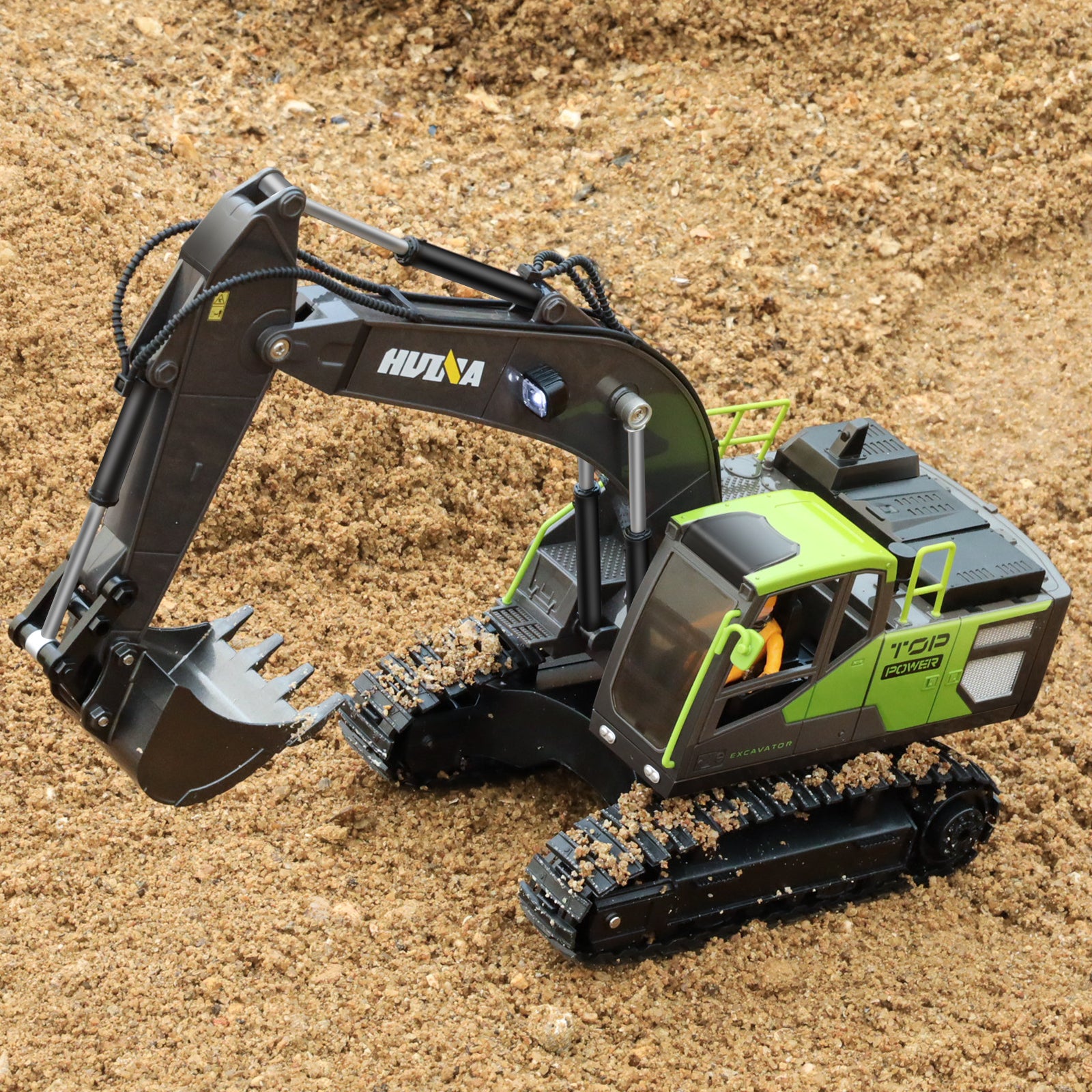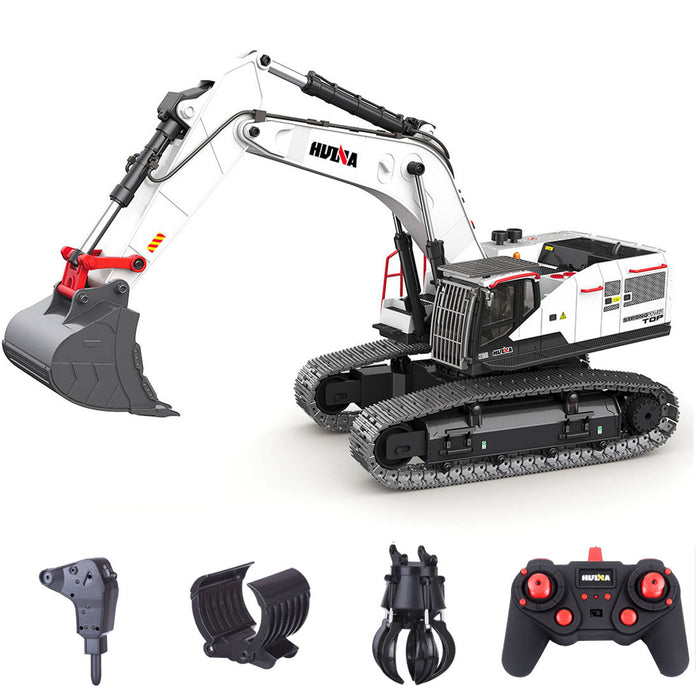Can a rc excavator Save You Time and Money? Here’s How
Wiki Article
Discover the Importance of Excavator in Modern Building And Construction Projects
Excavators are crucial tools in contemporary building projects. Their adaptability permits them to carry out a vast array of tasks, from digging and grading to demolition and website preparation. Advanced features, such as hydraulic attachments and GPS, improve their abilities and performance on work websites. As the industry evolves, the importance of excavators grows also extra. Understanding their role can disclose understandings right into the future of construction methods. What lies in advance for these makers?The Flexibility of Excavators in Numerous Projects
Excavators are commonly associated with large-scale construction tasks, their flexibility permits them to be made use of in a broad variety of applications, from residential landscape design to utility maintenance. In city settings, excavators can browse tight rooms to dig foundations for homes or install drainage systems. Their capability to carry out delicate tasks makes them perfect for landscape design jobs, where they can dig deep into for ponds or plant trees. On top of that, excavators play an essential duty in utility maintenance, effectively excavating trenches for pipelines or cords without interfering with surrounding locations. In farming applications, they help in land cleaning and soil prep work. Their versatility allows them to be equipped with various attachments, enhancing their capability throughout various jobs. This diverse nature of excavators not only enhances numerous building procedures but additionally demonstrates their integral role in contemporary facilities advancement and maintenance.Key Functions and Kinds Of Excavators
The discussion on crucial functions and kinds of excavators highlights the vital characteristics that make these devices vital in building. Different excavator kinds, each made for details tasks, show their flexibility and effectiveness throughout different applications. rc excavator. Comprehending these classifications and functions is vital for enhancing their usage in modern building and construction jobsExcavator Enters Review
Excavators play a critical role in contemporary construction, providing adaptability and effectiveness across different jobs. These heavy equipment systems can be found in numerous kinds, each tailored for specific applications. One of the most common kinds include crawler excavators, recognized for their stability on unequal terrain, and rolled excavators, which supply higher movement on paved surface areas. Mini excavators are preferred for small jobs and tight rooms, while long-reach excavators are created for deep digging. Furthermore, there are customized excavators, such as hydraulic excavators, which improve power and precision. Each type includes one-of-a-kind capacities, making them crucial for tasks ranging from digging and grading to demolition and material handling. Understanding these variants permits building specialists to choose the best excavator for their project requires.Trick Features Explained
Recognizing the vital attributes of excavators enhances their reliable application in building projects. Excavators are defined by their powerful hydraulic systems, which provide the needed force for digging, lifting, and relocating materials. Their verbalized arms permit a wide variety of movement, helping with accurate procedures in confined spaces. Furthermore, the range of attachments, such as pails, grapples, and augers, broadens their convenience to meet various project requirements. The size and weight of excavators also add to their stability and maneuverability on various surfaces. In addition, developments in innovation have actually brought about the integration of general practitioner and automation, improving accuracy and performance in excavation jobs. These features jointly place excavators as indispensable tools in modern construction.Applications in Building
Changing construction websites, excavators play a crucial duty across various applications, ranging from property building tasks to massive infrastructure growths. These versatile equipments are geared up for jobs such as digging structures, trenching for energies, and site grading. Various sorts of excavators, including spider, wheeled, and mini excavators, give particular advantages tailored to the task demands. Crawler excavators succeed in harsh surfaces, while wheeled excavators use flexibility on smooth surfaces. Small excavators are ideal for constrained areas, making them preferred in city setups. The efficiency and power of excavators considerably quicken construction procedures, ensuring prompt job completion. Their versatility additionally boosts their importance, enabling building and construction teams to take on a diverse selection of difficulties efficiently.Enhancing Effectiveness and Efficiency on Job Sites
Maximizing efficiency and efficiency on task sites is a vital objective in contemporary building and construction. Excavators play an essential duty in attaining this goal by simplifying various tasks. Their capacity to execute multiple features-- such as digging, grading, and lifting-- lowers the need for extra devices, consequently saving time and resources.Moreover, excavators enhance workflow by permitting faster conclusion of tasks. With sophisticated features like hydraulic attachments and GPS technology, they can implement precise procedures that decrease errors and remodel. This precision not just enhances the top quality of job but likewise enhances material use, adding to set you back savings.The flexibility of excavators allows them to adjust to different site problems, making sure that tasks progress smoothly despite obstacles. By incorporating excavators into building and construction procedures, teams can significantly enhance their overall efficiency, causing timely task completion and enhanced productivity.Safety Advantages of Using Excavators
Excavators substantially boost safety on building and construction websites via enhanced driver exposure and lowered manual work threats. By providing operators with a clear sight of their surroundings, excavators help to prevent mishaps and injuries. Furthermore, the machinery decreases the demand for workers to take part in unsafe hand-operated tasks, even more promoting a safer work setting.Boosted Operator Presence
Although building and construction websites can be chaotic and loaded with prospective hazards, improved driver visibility plays a crucial duty in guaranteeing safety and security when utilizing excavators. Modern excavators are developed with huge, unhampered home windows and tactically placed mirrors, allowing operators to maintain a clear sight of their surroundings (rc excavator). This enhanced presence is essential for detecting pedestrians, other equipment, and various barriers, substantially minimizing the threat of mishaps. Furthermore, many excavators integrate advanced modern technology, such as cameras and sensors, to give drivers with added point of views, even more enhancing recognition. The ability to see even more plainly not just aids in effective operation but also promotes a safer job setting, making it less complicated for drivers to navigate intricate building sites without endangering safety criteriaLowered Handbook Labor Dangers
When manual labor is decreased with using excavators, many safety advantages emerge, considerably boosting the wellness of building and construction workers. Excavators reduce the physical stress connected with heavy training and repeated jobs, properly decreasing the threat of musculoskeletal injuries. By automating processes such as excavating, grading, and relocating products, they permit employees to keep a safer distance from prospective dangers. In addition, excavators are equipped with advanced security attributes, such as rollover protection systems and improved operator ergonomics, which even more guard personnel on site. The result is a considerable reduction in workplace accidents and injuries, leading to increased performance and spirits among construction teams. Eventually, the adoption of excavators contributes to a much safer and a lot more effective construction atmosphere.Excavators in Earthmoving and Site Prep Work
In modern building, a considerable portion of earthmoving and site preparation jobs relies upon the effectiveness and versatility of excavators. These equipments are developed to handle different soil types and surface, making them essential for grading, excavating, and trenching tasks. Their hydraulic arms can be equipped with various add-ons, such as containers and augers, permitting drivers to customize their method based on details job requirements.Excavators succeed at moving big quantities of planet promptly and successfully, which accelerates the overall construction timeline. They can navigate tight rooms and challenging websites where traditional devices may struggle, boosting productivity. Furthermore, the accuracy of excavators assurances that site preparation sticks to stringent requirements, minimizing the risk of errors that could lead to pricey rework.The Function of Excavators in Demolition Tasks
Excavators play a vital function in demolition tasks, as they have the power and agility required to dismantle structures successfully. Geared up with numerous accessories such as hydraulic breakers, shears, and grapples, these machines can adapt to various demolition requirements, whether for little buildings or large industrial sites. Their versatility enables operators to tackle intricate tasks while keeping safety and security and precision.In enhancement to their demolition capacities, excavators help with debris removal, making certain that work sites stay secure and organized. By breaking down structures into workable pieces, they enable streamlined clearing up and recycling home of materials, lining up with modern-day sustainability efforts.Moreover, excavators can access limited rooms and navigate uneven terrain, making them vital in metropolitan demolition jobs. Generally, their durable style and multifunctionality make excavators an essential asset in the demolition phase of construction, adding significantly to task timelines and performance.

Future Trends in Excavator Innovation and Use
As the construction market progresses, developments in excavator innovation are positioned to transform their Look At This usage and efficiency significantly. One substantial trend is the integration of automation and expert system, enabling excavators to run with very little human intervention. This shift will certainly improve precision in jobs such as grading and trenching, minimizing human error and enhancing productivity.Additionally, the increase of hybrid and electric excavators is forming an extra sustainable construction environment, decreasing carbon discharges and fuel costs. Enhanced telematics systems are also emerging, making it possible for real-time monitoring of machine performance and upkeep needs, which can bring about far better operational efficiency and longer tools lifespan.Moreover, advancements in attachment innovation are expanding the versatility of excavators, enabling them to carry out a more comprehensive variety of jobs. The mix of these trends shows a future where excavators are smarter, greener, and much more adaptable, ultimately reshaping construction job dynamics.
Often Asked Inquiries
Just How Do Excavators Compare to Other Construction Machinery?
Excavators, defined by their versatility and power, excel in digging and earthmoving compared to other machinery. Their capacity to execute numerous jobs, consisting of training and demolition, makes them indispensable in construction projects, improving general efficiency.
What Is the Average Life Expectancy of an Excavator?
The ordinary lifespan of an excavator typically ranges from 7,000 to 10,000 operating hours, depending on upkeep, use conditions, and version. Appropriate treatment can expand this lifespan, ensuring peak efficiency throughout its operational years.How Are Excavators Preserved for Ideal Performance?
Excavators require regular upkeep for peak performance, including regular inspections, liquid checks, filter substitutes, and timely fixings. Applying a precautionary upkeep routine assists lengthen their life expectancy and guarantees reliable procedure in various building and construction environments.What Are the Costs Linked With Renting Out vs. Getting an Excavator?
The expenses connected with leasing versus buying an excavator vary considerably. Renting offers lower upfront costs yet can build up gradually, while acquiring calls for a significant first financial investment, however provides long-lasting cost savings and asset possession advantages.What Training Is Required to Run an Excavator?
Running an excavator needs specialized training, normally consisting of safety and security protocols, maker operation methods, and environmental awareness. Certification programs frequently pop over here mandate practical experience, making it possible for drivers to take care of various tasks efficiently while ensuring compliance with industry guidelines. The most typical kinds consist of spider excavators, known for their security on unequal surface, and wheeled excavators, which supply greater flexibility on paved surface areas. Miniature excavators are favored for small-scale jobs and limited spaces, while long-reach excavators are made for deep digging. Furthermore, there are customized excavators, such as hydraulic excavators, which boost power and precision. Different types of excavators, consisting of spider, wheeled, and mini excavators, offer details benefits tailored to the project demands. Spider excavators excel in rough terrains, while rolled excavators provide wheelchair on smooth surfaces.Report this wiki page